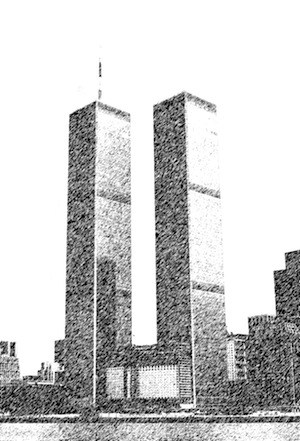 Ten years after the terrorist attacks that destroyed them, it’s still strange to see the New York skyline without the twin towers of the World Trade Center.
Ten years after the terrorist attacks that destroyed them, it’s still strange to see the New York skyline without the twin towers of the World Trade Center.
I visited New York with my family when I was eight years old. It was 1996, only three years after a truck bomb had been detonated under the north tower with the aim of killing thousands of people as the concrete rained down on them. Luckily, the attack had failed to cause such damage, so the twin towers were still standing during my visit.
My brother insisted that we go up a skyscraper while we were taking in the Big Apple. My mother took a lot of convincing, but ultimately relented.
It was a cloudy day, so the line to get to the observation area atop the building was relatively short. I don’t remember which of the two we went into, but what I remember most vividly was the elevator ride up to the top. At 110 floors, the towers were among the tallest buildings in the world, and the elevator took ages to climb its way up.
The security guard in the elevator was a black man in his late 20s. I only note this because black people were still a novelty to me at the time. In my mind, they all behaved like Eddie Murphy — which is, outrageous. This man, however, was stern. As soon as the 20 or so tourists had crammed into the elevator he forcefully shushed everyone until it was still. It was an uncomfortable silence, but people must have assumed it was for a good reason.
The elevator climbed up in dead silence for minutes. Each time someone made even the slightest of noises, the stern black man would put his finger to his lips and shush. Then, at about floor 50, the silence was suddenly broken. Our guard burst into song, singing a joyful show tune at the top of his lungs.
This good-natured gag made the rest of the elevator ride rather enjoyable, and funny, for he continued singing all the way to floor 107 as though he were oblivious to the dozens of foreigners gawking, snapping photos and giggling. He had proven to be a real black man after all — in the Eddie Murphy sense, that is.
I often think about that man. I wonder if he had taken the security job as a temporary gig or if he was there long-term. I wonder if he was inside the World Trade Center when jet planes flew into the buildings. I wonder if he made it out alive.
In the decade since the terrorist attacks that killed nearly 3,000 people, the memory of that September day has become tarnished. There was indeed a moment when the whole world felt like New Yorkers, but subsequent wars and hundreds of thousands of further deaths have made the initial attacks more of an afterthought. The horrible events of that day were soon reduced to the glib marketing of “9/11” and used as a bludgeon to fight ideological battles for the rest of the decade.
Today, those numbers carry with them the weight of one of the ugliest periods in American history. Questionable wars, island prison camps, CIA kidnappers, torture. The mania and the thirst for revenge inspired by the 2001 attacks soon turned one of the greatest nations on Earth into a shadow of its former self. Today, the United States is broke, overstretched and in danger of erasing the remaining laws that once guaranteed Americans safety and privacy from their own government.
In the name of terrorism, many governments including Canada passed far-reaching laws that impinge ever more on the rights of citizens. Terrorists became an amorphous threat that could strike at any moment, so more and more rights were sacrificed in the name of security.
But whenever I start thinking this way, I remind myself of that New York elevator ride 15 years ago. Obviously the singing was a practiced routine, but it was meant to get stuck in visitors’ heads. All these years later, it helps remind me of the human tragedy of the World Trade Center attacks.
And despite some of the awful things that later happened in the name of the victims, we must still remember those victims and hope for a world in which there are more jovial singers than angry warriors.
—
graphic: Brianna Whitmore/The Sheaf